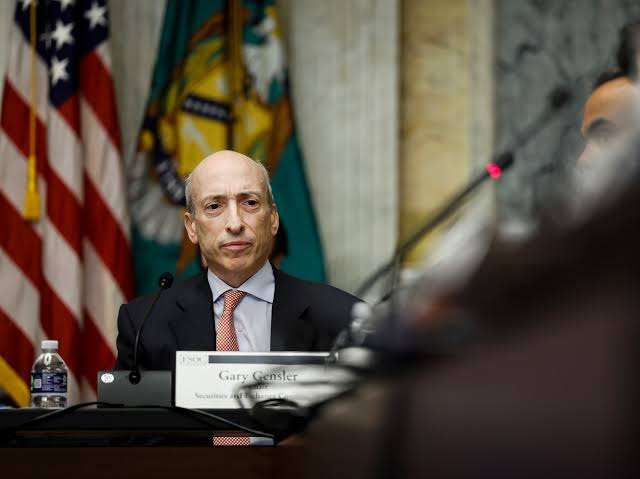Gary Gensler, heading the SEC since mid-2021, emphasized concerns about exchange monitoring, stablecoins, custody, and ETPs.
It seems indisputable that Gary Gensler desires a complete overhaul of crypto regulation in the United States.
Gary Gensler’s Regulatory Priorities
This objective was articulated by Gensler, who has presided over the SEC since mid-2021, in a speech delivered three months after his Senate nomination. “Large portions of the cryptosphere are perched atop regulatory frameworks that safeguard investors and consumers, prevent illicit activity, maintain financial stability, and yes, protect national security,” he stated.
His primary concerns revolved around exchange monitoring, stablecoins, custody, and ETPs. The US crypto space, according to Gary Gensler, was unlawful for these reasons. Utilizing enforcement operations, judicial battles, rule-changing processes, and congressional petitions for sustainable legislative remedies, his agency sought to alter that.
Gary Gensler pursued this objective with vigor. Binance and Coinbase are two cryptocurrency firms that his department has prosecuted. Regulation in the United States has evolved due to opposition to staking services, crypto loan companies, and NFT initiatives.
Nonetheless, the bitcoin ETF approvals from last week dealt Gensler a severe and lasting setback. As anticipated, several individuals lauded the approvals as a turning point, illustrating the expanding connection between traditional finance and cryptocurrencies.
Gensler characterized the ETF certification as “the most sustainable course of action” after a protracted deliberation and a court setback against Grayscale Investments.
Gensler’s support was not substantial. The document comprised four footnotes and an admission of defeat in a multifaceted assault on Bitcoin, which characterized it as “a speculative, volatile asset utilized for illicit activities such as ransomware, money laundering, sanction evasion, and terrorist financing.”
Gensler stated, “Although we authorized the trading and listing of specific spot bitcoin ETP shares today, we did not endorse or promote bitcoin.”
Although Gensler was one of three commissioners who approved the bitcoin ETFs, he likely did so to shield the SEC from a potential legal attack should it reject them. After investing so heavily in their schemes, BlackRock and Fidelity may be compelled to accept a loss in light of Grayscale’s legal victory.
The market, according to Gensler, had shifted in opposition to the SEC’s crypto stance. Larry Fink, CEO of BlackRock, intended for the unveiling to be called “step one in the technological revolution in the financial markets.” The asset management behemoth is considering introducing spot-ether ETFs among its new offerings.
By offering the Bitcoin ETF as an incentive, Gary Gensler is presumably attempting to maintain as much momentum as feasible for his other cryptocurrency objectives.
In anticipation of 2024, his preparations are challenging.
Recent Developments and Challenges
The inability of Congress to perform fundamental governmental duties appears to preclude legislative remedies for stablecoin. Provisions related to stablecoins might be incorporated into forthcoming legislation.
The outcome remains uncertain due to the genuine Republican opposition to Gary Gensler and the ongoing national election season. A case resolution is implied by the SEC’s recent decision to withdraw proceedings against Ripple CEO Brad Garlinghouse and co-founder Chris Larsen.
Regarding the documentation for institutional XRP transactions, both parties are “at an impasse.” Judge Analisa Torres may impose sanctions based on these documents.
Following a multibillion-dollar settlement reached between the US Department of Justice and Binance and its former CEO, Changpeng Zhao, the SEC is now left to battle Binance on its own.
Although that war has been ongoing for quite some time, its ultimate result remains uncertain. For the diligent, the Ripple case has been ongoing for three years. An SEC-related court lawsuit that alleges deceit damages the organization.
The ongoing SEC-Coinbase legal dispute remains multifaceted.
Opponents dispute the SEC’s proposal to amend custody regulations to include cryptocurrencies in early 2023. Industry representatives, crypto-native custody firms, and Commissioner Hester Peirce oppose the proposal.
Gensler has gained some battles during his multifront assault. However, opposition appears pervasive, as Gensler has personally incited discontent.
If a “win-loss” scenario is possible, the legacy of this conflict and Gensler’s ability to govern may be contingent on the capabilities of Congress, the White House, and the United States government.
Gensler pressured Congress to act with intent. In the absence of such amendments to U.S. law, SEC regulatory preferences might vary. In 2026, midway through a presidential tenure led by Biden, Trump, or another candidate, Gensler’s term concludes.
Although the SEC, under the leadership of Gensler, has reached notable settlements with BlockFi, Kraken, and Nexo, the absence of a conclusive judicial decision means that these cryptocurrency cases are coming to an end without establishing a precedent that could potentially alter the regulation of cryptocurrencies in the United States.
In the coming year, Gensler’s crypto agenda may succeed or fail.












